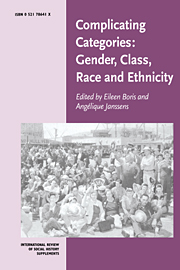Book contents
- Frontmatter
- Contents
- Notes on Contributors
- Complicating Categories: An Introduction
- Family Concerns: Gender and Ethnicity in Pre-Colonial West Africa
- Narratives Serially Constructed and Lived: Ethnicity in Cross-Gender Strikes 1887–1903
- Competing Inequalities: The Struggle Over Reserved Legislative Seats for Women in India
- “The Black Man's Burden”: African Americans, Imperialism, and Notions of Racial Manhood 1890–1910
- Sex Workers or Citizens? Prostitution and the Shaping of “Settler” Society in Australia
- From Muscles to Nerves: Gender, “Race” and the Body at Work in France 1919–1939
- “Blood Is a Very Special Juice”: Racialized Bodies and Citizenship in Twentieth-Century Germany
“The Black Man's Burden”: African Americans, Imperialism, and Notions of Racial Manhood 1890–1910
Published online by Cambridge University Press: 14 January 2010
- Frontmatter
- Contents
- Notes on Contributors
- Complicating Categories: An Introduction
- Family Concerns: Gender and Ethnicity in Pre-Colonial West Africa
- Narratives Serially Constructed and Lived: Ethnicity in Cross-Gender Strikes 1887–1903
- Competing Inequalities: The Struggle Over Reserved Legislative Seats for Women in India
- “The Black Man's Burden”: African Americans, Imperialism, and Notions of Racial Manhood 1890–1910
- Sex Workers or Citizens? Prostitution and the Shaping of “Settler” Society in Australia
- From Muscles to Nerves: Gender, “Race” and the Body at Work in France 1919–1939
- “Blood Is a Very Special Juice”: Racialized Bodies and Citizenship in Twentieth-Century Germany
Summary
Take up the White Man's Burden –
Send forth the best ye breed –
Go bind your sons to exile
To serve your captives' need […]
Comes now, to search your manhood
Through all the thankless years,
Cold-edged with dear-brought wisdom,
The judgment of your peers!
Rudyard Kipling, 1899Take up the Black Man's burden –
“Send forth the best ye breed”,
To judge with righteous judgment
The Black Man's work and need […]
Let the glory of your people
Be the making of great men,
The lifting of the lowly
To noble thought and aim […]
J. Dallas Bowser, 1899In 1899, about fifteen years after the Conference of Berlin accelerated Europe's partitioning of Africa, African-American preacher Henry Blanton Parks fervently believed the fate of Africa would be determined during the twentieth century. Parks struggled long and hard as a young man to secure an education in Georgia and rise in the ranks of the African Methodist Episcopal (AME) Church; he earned a reputation for having an expansive outlook in the process. By the time he became Secretary of Home and Foreign Missions, Reverend Parks not only located Christian redemption of Africa within the promise of a new century, he authored a book to convince other African Americans that it was their duty to conquer the continent for God, for Africans, for themselves. In Africa: The Problem of the New Century, Parks contended that if the AME Church failed to secure a righteous “destiny […] [for] the junior races of the world […] [and] historic Africa”, the scramble for Africa would blight the continent with liquor, vice, and genocide.
- Type
- Chapter
- Information
- Complicating Categories: Gender, Class, Race and Ethnicity , pp. 77 - 100Publisher: Cambridge University PressPrint publication year: 2000

